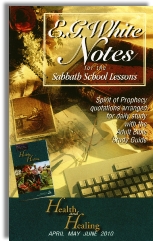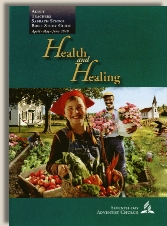|
||||||||||||||
Commentary on "The Environment"
Day 2: Sunday, April 25, 2010
Today’s lesson is titled "Creating the Environment" and is specifically about God and the creation of this world and of Adam and Eve. Overall there are some good points made in this lesson.
The point about creation being incompatible with the theory of evolution is a good one. The first two chapters of Genesis provide us with an account of the fact that all things came into existence by the direct command of God.
The creation of Adam and Eve are considered the crowning act of creation because they were made in the image of God.
One item from the Teachers Comments on page 55 of the Teacher’s Edition will be addressed here. At the bottom of the page is the summary of the lesson for the Teacher. Here it states:
Summary: The environment, as God made it, has natural promoters of health and happiness that we need to use, promote, and protect.
Although some “promoters of health” are mentioned during the other lessons this week, it is left to the teacher and students to determine what promoters of health should be used, promoted and protected. Because there are so many, and the needs for each individual differ based on life circumstances, illnesses, dispositions, genetics, etc., it would be pointless to speculate which of these things are important.
Water, sunlight and a few other items are mentioned throughout the week. However we must keep in mind the overall limits of physical health in this world. We live in a fallen world and no matter how healthy we are or become, we all face the same physical destination: death.
In a later lesson this week (Wednesday) the author will suggest vegetarianism as one of the solutions to the problems in our world. (On Wednesday’s lesson we will address the issue in more detail.) When diet becomes a significant issue for Christians, we are dealing with very dangerous ideas.
Although our bodies die, as Christians we must be concerned about something of much more importance than our bodies. Our physical well-being is of temporal importance. Our spiritual well-being is of eternal importance. Scripture is clear about the fact that providing for our bodies is good, but has very serious limits. Emphases on the well-being of our bodies are referred to as “worldly fables” (NASB) in the book of Timothy. First Tim. 4:7-8 reads:
Have nothing to do with irreverent, silly myths. Rather train yourself for godliness; for while bodily training is of some value, godliness is of value in every way, as it holds promise for the present life and also for the life to come.
This passage begins with a warning about those who teach about abstaining from certain foods that God created. We are told in 1st Tim. 4:1-5:
Now the Spirit expressly says that in later times some will depart from the faith by devoting themselves to deceitful spirits and teachings of demons, through the insincerity of liars whose consciences are seared, who forbid marriage and require abstinence from foods that God created to be received with thanksgiving by those who believe and know the truth. For everything created by God is good, and nothing is to be rejected if it is received with thanksgiving, for it is made holy by the word of God and prayer.
This is a strong warning to those who would make marriage or diet significant in the lives of believers. In this passage our Lord is very clear about what makes a food item good – the word of God and prayer. It is not a list from the book of Leviticus that identifies what is good; it is the fact that our Lord makes things holy through his word and through the prayer of a believer.
Perhaps a better focus for Christians is to focus on Godliness as stated in 1st Tim. 4:8. A good place to start identifying what Godliness is for Christians is the Sermon on the Mount. Read Matthew chapters five to seven. At the beginning, and at several places throughout this passage, Jesus identifies many things that should be part of a believer’s life.
As Christians we must beware of being promoters of “natural promoters of health” and be more concerned with promoting the kingdom of God and the godliness associated with that kingdom as identified by Jesus and his disciples in the New Testament.
Summary
- Fiat creation (creation out of nothing) by God is not compatible with the Darwinian theory of evolution.
- Adam and Eve were the crowning act of God’s creation as they were made in his image.
- Promoting “natural promoters” of health and happiness are not part of the gospel message. We do a disservice to others by promoting the well-being of physical bodies which are temporal, while ignoring or making secondary the eternal consequences of spiritual life.
- Diet, clothing and other aspects of physical life are issues which detract from the core issues of Godliness. In the Sermon on the Mount Jesus even told the listeners that being concerned with “what we shall eat” or “what we shall drink” are things that Gentiles are concerned with, but should not be concerns of his followers.
Copyright 2010 BibleStudiesForAdventists.com. All rights reserved. Revised April 22, 2010. This website is published by Life Assurance Ministries, Glendale, Arizona, USA, the publisher of Proclamation! Magazine. Contact email: BibleStudiesForAdventists@gmail.com.
The Sabbath School Bible Study Guide and the corresponding E.G. White Notes are published by Pacific Press Publishing Association, which is owned and operated by the Seventh-day Adventist church. The current quarter's editions are pictured above.
Official Adventist Resources
Standard Edition Study Guide Week 5
Teacher's Edition Study Guide Week 5
Easy Reading Edition Study Guide Week 5
Search the Complete Published Ellen G. White Writings


